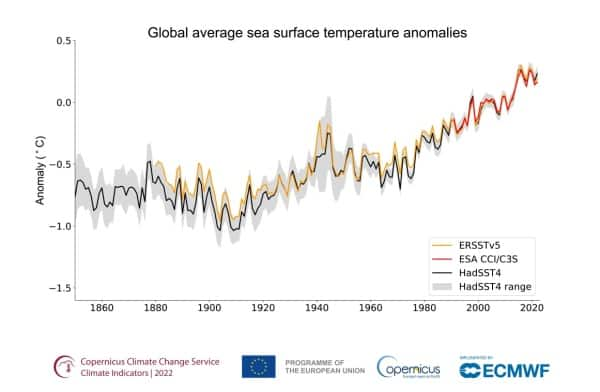Description

Disclaimer: Copyright infringement not intended.
Context
The current global situation of extreme heat waves, including the hottest June ever recorded and the likelihood of July becoming the warmest month in hundreds, if not thousands of years.
Details
- June marked the planet's hottest ever recorded month, and July is on track to become the warmest in centuries or even millennia.
- Sweltering temperatures have led to extreme heat warnings, wildfires, and poor air quality globally.
- Ocean temperatures have also soared, leading to the occurrence of marine heat waves (MHWs) with devastating effects on marine ecosystems and human communities.
Understanding Marine Heat Waves
- MHWs are extreme weather events in which the sea surface temperature in a specific region rises to 3 or 4 degrees Celsius above the average for at least five days.
- These events can last for weeks, months, or even years, affecting marine life and coastal communities.

Impact on Marine Ecosystems
- An increase of 3 or 4 degrees Celsius in ocean temperatures can have catastrophic consequences for marine life.
- MHWs can cause fish kills, destroying kelp forests, and triggering coral bleaching events.
- Coral bleaching reduces the reproductive ability of corals, endangering marine species that rely on coral reefs for survival.
Marine Heat Waves and Invasive Species
- MHWs fuel the growth of invasive alien species, disrupting marine food webs and affecting wildlife.
- These events force species to change their behavior, leading to increased risks, such as whale entanglements in fishing gear.
Impact on Human Communities
- Higher ocean temperatures associated with MHWs can intensify storms like hurricanes and tropical cyclones.
- Storms traveling over warm oceans gather more water vapor and heat, resulting in stronger winds, heavier rainfall, and more flooding upon landfall, causing heightened devastation for human communities.
- Coastal communities reliant on coral reefs for food, income, and protection suffer socio-economic impacts when MHWs destroy these reefs.
Global Warming and MHWs
- A 2018 study reveals that global warming has led to longer-lasting, more frequent, and more intense MHWs in recent decades.
- 87% of MHWs can be attributed to human-induced warming, which is linked to the absorption of greenhouse gas-induced heat by the oceans.
- The increase in global mean sea surface temperature and the onset of El Niño conditions further exacerbate MHW occurrences.
Ominous Future Impact
- A combination of soaring global air and ocean temperatures, increased MHWs, and record low Antarctic ice-sea levels is creating an unprecedented future impact.
- Scientists express concerns about the unknown consequences of such occurrences.
|
PRACTICE QUESTION
Q) Marine heatwaves (MHWs) have emerged as a global concern, impacting marine ecosystems and coastal communities. Discuss the causes and consequences of MHWs, emphasizing their devastating effects on marine life, coral reefs, and coastal regions. (150 words)
|
.jpg)
https://indianexpress.com/article/explained/explained-climate/marine-heat-waves-impact-cause-explained-8855048/













